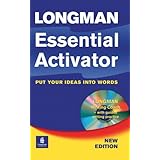Role-plays, or simulations are one of the ways ESL instructors can ease students' transition into using English in real world situations. A simulation is where students act out a real-life situation, for example checking into at a hotel, but do not act out a different personality. Role-plays are where students take on different personalities. In a role-play, for example, one student may be asked to take on the role of "an angry neighbor" which is out of character for the student. Role-plays require more imagination by students and teacher and can be difficult to manage because they are unpredictable. The initial scenario develops from the students intenerating with each other and can literally go in any direction. This gives students practice in a non-threatening environment, and gives the motivation and involvement where they have to think in English. Role-plays are interesting, memorable and engaging, and students retain the material they have learned. In their assumed role, students drop their shyness and other personality and cultural inhibitions, making them one of the best tools available for teaching a second language.
Here are a few pointers and suggestions to assist ESL teachers using and managing role-plays:
- The more engaging the better. The value of role-plays come from students immersing themselves in the material.
- Choose a 'hot' topic and stage a debate. Assign students positions on the topic (for/against). This will get students out of their personality and into the role where they do not have the same inhibitions.
- Preparation is very important to success. Give students 'personality cards' which sketch out their personal characteristics or scenario. Divide students into groups and give them time to sketch out various scenarios, and go over extra or special vocabulary ask them to discuss how they will act, think about the character and plan what they will say. For example, what are possible responses/replies for the angry neighbor?
- The teacher, as facilitator of the role-play must support students in their role, i.e. they 'are' in the backyard arguing over the fence. Don't do anything to interrupt the pretend environment. Leave grammar correction to the end. Correcting students in the middle of an argument interrupts the pretend environment. Make notes and do a debriefing after.
- Exaggeration is good! Encourage students to exaggerate their actions, opinions and movements. Exaggeration helps students immerse themselves in the role.
- Stage a rehearsal first. Have students practice their role in small groups with coaching from the other students.
- While the role-play or debate is in progress, have other students suggest vocabulary first, and act as backup if they do not know.
Role-plays are unpredictable which makes them both a valuable learning tool and at the same time difficult to manage. Sketch out the various routes the role-play can take from the initial scenario. This will give you some idea what to expect and avoid any surprises.
Suggested topics for role-plays:
Lovers problems (He has to move away to get a new and better job)
Spending money (Government, United Nations etc. spending money, who gets what)
Traveling (where would you go? what would you do?)
Debates on current affairs/politics. Extreme opinions or opinions at the opposite ends of the spectrum work well (i.e. left wing/right wing etc.)
Role-plays can range from 30 minutes or one hour to a year-long corporate simulation for business English. Staging role-plays can be challenging for an instructor, but is also great fun. After you have done a few, you will know what to expect and feel more confident. My experience is students love them retain what they learn, and often leave the classroom laughing and still arguing all the way out of the building!
About The Author
George and Daisy Stocker have travelled the world teaching ESL to children and adults. Their website,
http://www.efl-esl.com/ offers ESL curriculum, activities, an online forum for ESL teachers and students, free newsletter for ESL teachers and more!






